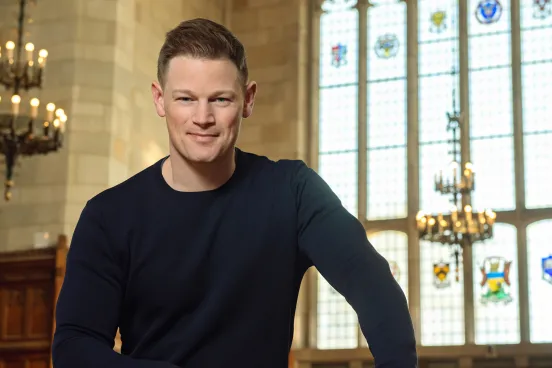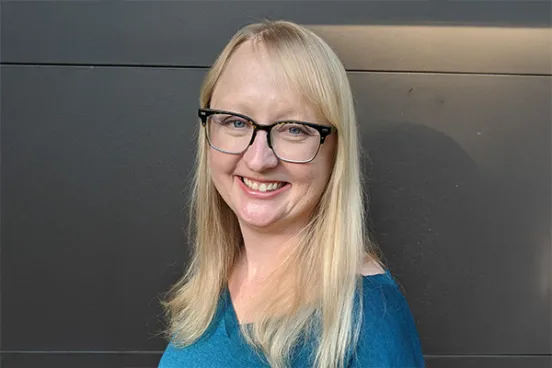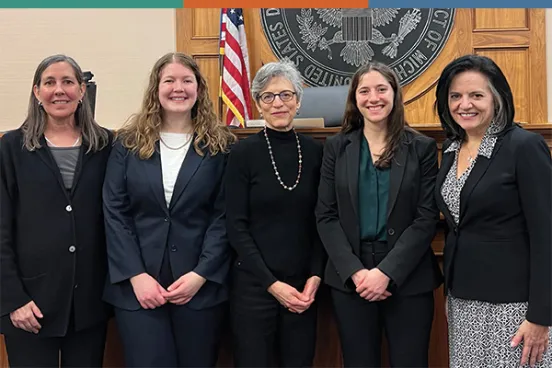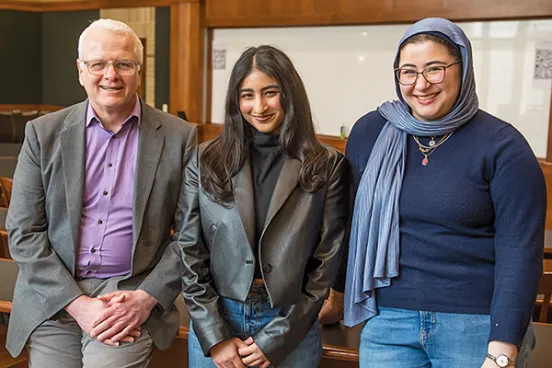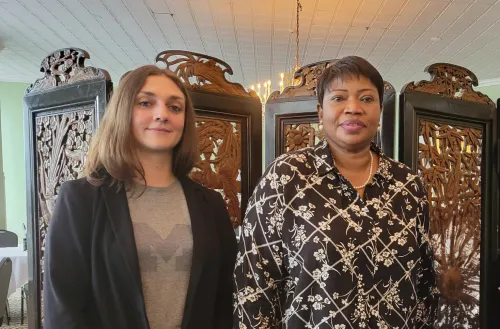
When Kate Powers, ’20, graduated from the Law School, she planned to travel to Sarajevo on a Fulbright research grant. There, she would focus on war crimes cases before the national courts of Bosnia and Herzegovina.
However—due to the pandemic—she faced a six-month travel delay. Making lemonade out of lemons, Powers found a short-term fellowship with the Global Accountability Network (GAN), an organization that works to bring justice to victims of war crimes, crimes against humanity, and genocide.
Not only was it a good fit for Powers, who had known since starting law school that she wanted to work as an international human rights lawyer, but it turned into a commitment well beyond the six-month fellowship.
“I got to do some really interesting and high-level work right away,” says Powers. “And so when that fellowship ended and I went to Bosnia, I elected to continue as a volunteer, doing ad hoc work.” When the executive director of GAN left the organization in March 2022, Powers stepped into the role on a volunteer basis.
Accountability projects
GAN’s work is organized around “accountability projects” in five geographic areas: the Pacific Rim, Syria, Ukraine, Venezuela, and Yemen. Prosecutors and others who have worked in international criminal tribunals supervise a network of students from nearly a dozen law schools who gather open-source information—i.e., information that is publicly available—that documents potential crimes. They format the information to allow for quick manipulation of data.
“So you can look at Syria, for example,” says Powers, who notes that some “really, really great” U-M students currently work on this project. “The conflict has been going on for more than 10 years, and this documentation allows for what's called ‘representational charging.’ You probably won’t be able to charge every single war criminal with every single crime that was ever committed. These formats allow you to get a big picture of the most egregious crimes and the most responsible perpetrators, and that allows a future prosecutor to make their charging decisions.”
Powers works with GAN’s founder and its president—both of whom have deep experience prosecuting international human rights abuses—to teach the next generation of law students and to encourage them to enter into this area of the law.
Kate Powers, ’20“Time is our enemy. You lose evidence. You lose the quality of testimony from witnesses. You lose political will.”
She notes that the work of GAN would not be possible without the dedication and creativity of the students they work with. Their combined efforts help ensure information is collected in a timely and comprehensive manner, which is vital to the success of potential future prosecutions.
“People are proactively documenting and working on getting cases developed—including for what's going on in Russia and Ukraine now—because time is our enemy. You lose evidence. You lose the quality of testimony from witnesses. You lose political will.”
International tribunals
GAN and other human rights organizations are not in imminent danger of running out of work. Powers represented GAN as one of the sponsors at a conference last summer where she met prosecutors who have tried crimes from Cambodia to Lebanon to Rwanda and elsewhere. Titled “Standing up to Aggression: From Nuremberg to Kyiv,” the conference centered on Russia’s invasion of Ukraine, with much of the discussion about the technical and legal logistics of setting up a hybrid or international tribunal to hold the Russian Federation’s leaders responsible for the crime of aggression.
“Unfortunately, the International Criminal Court does not have jurisdiction over the crime of aggression in this case,” says Powers. GAN’s proposed strategy is for the United Nations (UN) General Assembly to pass a resolution that would have the government of Ukraine enter into negotiations with the secretary-general of the UN, bypassing the UN Security Council, where Russia has veto power.
Once a trial is set up, it can go on for years, if not decades, says Powers.
“The Extraordinary Chambers in the Courts of Cambodia were just completed, and that involved the Khmer Rouge genocide from decades and decades ago. That is not the ideal model.”
She adds that it is sometimes easy to view international justice as a failure, with many stories of victims who never got justice. However, justice sometimes does happen, just at a very slow pace.
“There's a case from the International Criminal Tribunal for Rwanda,” says Powers. “For the first time, sexual violence was acknowledged to be a part of a genocidal campaign. At the time, it was a very big deal, but since then it’s a norm in international law. It's not a question. And so that's something I would point to as a success.”
Looking forward
Powers eventually did that fellowship in Sarajevo. Since she returned in December 2022, she has worked as a researcher and consultant on public international law. But her work with GAN continues.
“I don't think there's any other avenue through which I could be where I am now, where I actually get to work on international criminal law as someone who's not even three years out of law school,” she says. But she acknowledges that the work can be emotionally exhausting.
“It takes a special emotional skill to do this kind of work; you really have to compartmentalize. And I think I'm fortunate: I have really good friends, a really good family, a really good dog. I have these different outlets to make sure that I'm just not bogged down by sadness all the time because it can be overwhelming. I would love it if GAN was obsolete. But that's just not reality.”



